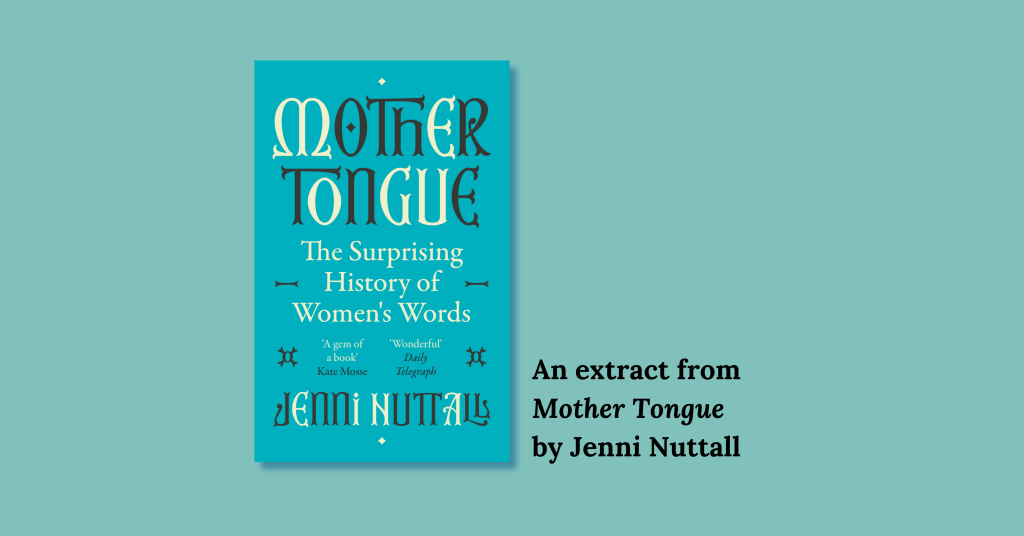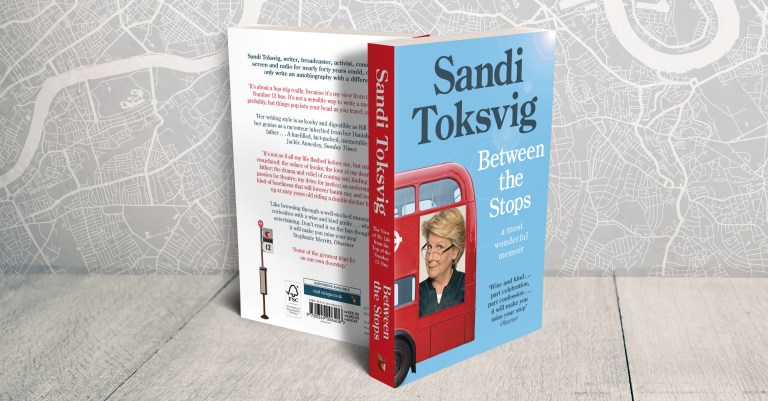An extract from Mother Tongue by Jenni Nuttall

Spinster. Cougar. Carer. Matron. Wife.
So many of the words we use to articulate the experiences women share feel awkward or alien. Medical terms are accurate but antiseptic. Slang often perpetuates stereotypes. Where are the plain, honest words for women’s daily lives?
From the dawn of Old English to the present day, Dr. Jenni Nuttall guides readers through the evolution of the words we have used to describe bodies, menstruation, sexuality, the consequences of male violence, childbirth, paid and unpaid work, and gender.
Along the way, she argues that, paradoxically, as women have made slow progress towards equality, we’ve lost some of the most expressive and eloquent bits of our vocabulary.
Inspired by Nuttall’s deep knowledge of the English language as well as conversations with her teenage daughter, this is a book for anyone who loves language – and for feminists who want to look to the past in order to move forward.
AN EXTRACT FROM FLUX
In giving treatment for periods which are somehow blocked or stoppered, Anglo-Saxon cures recognised that periods are in essence a process of flowing. I like the fluidity of words like oferflownis, period being too static a word to capture an experi- ence which is, in all senses, liquid, beginning and ending with streaks and spots, flowing heavily and lightly. Another Old English word for menstrual bleeding, flewsa, is a relative of the Latin flux, ‘flowing’. In medieval medicine, a flux is a running- out of liquid from the body, whether semen, blood or the product of illness or disease. The dysentery that killed Henry V and hun- dreds of his victorious army on campaign in France in 1422 was called the ‘bloody flux’, a name that makes the grim reality of its blood-filled diarrhoea all too plain. Though some fluxes could be fatal, a medieval English translation of a fourteenth-century Latin surgical handbook is careful to say that ‘alle fluxe of blode’ is unnatural and should be treated immediately except for ‘the mesurable menstrues’: the monthly period. Medieval physicians knew that period blood was to be expected: a flux unlike other much more dangerous bleeding.
I’d rather have a flux than a period, I think. At least nouns like flux and flow can be turned into usable verbs: our bodies flux and flow, discharging like a battery and then recharging. Flux in physics measures the rate at which liquid or matter or energy flows out from or over something. Doc Brown’s flux capacitor in Back to the Future stores energy and releases it in a burst to fire the DeLorean through time. But the word period can’t easily be converted into an action. Nobody says I’m perioding, and I’m menstruating sounds absurdly formal when said out loud. I’m on my period, we hiss under our breath, or, more dramatically, I’m bleeding. The latter is somehow right and wrong: it is undoubt- edly blood but not the sort of blood that should panic you, at least once you get used to it.
Words like flux and menstrues arrived in English as barely changed Latin – this is the jargon of academics, doctors and surgeons writing in technical terms. Yet laypeople too were curious about knowledge of all kinds and wanted to read about
it in a language they could understand. At the end of the four- teenth century, a priest called John Trevisa translated a kind of medieval Encyclopaedia Britannica with the encouragement of a Gloucestershire nobleman named Thomas, Lord Berkeley for whom Trevisa worked as a private family chaplain. Medieval readers like Thomas (and his daughter Elizabeth, who also commissioned translations) wanted to explore philosophy, med- icine, religion and history in their own mother tongue. They also wanted to read about the workings of their own bodies. Prompted by words like flux and superfluitas in his Latin source which describe how the body discharges various bodily fluids, Trevisa calls menstruation ‘such a rennyng as women have’.
Rennyng is our modern word running: in medieval English menstrual blood ran just as water or paint runs. This feels spot- on to me: to menstruate is to learn the irresistible properties of liquid, its irrepressible flow that soaks and stains. For something that is supposed to be measurable in dinky amounts – teaspoons and eggcups – period blood always seems so plentiful. Those who menstruate are experts in the fluid physics of capillarity and sorptivity, the rates at which fluid moves and absorbs. We divide our menstruating days and nights by what volume of liquid a tampon or a pad can hold for how much time. We worry, perhaps obsessively, about failing in our calculations and leaking over clothes, chairs or bedding. We make menstruating a magic trick, the one where you pour water into a paper bag and then – pouf! – make it vanish. Period blood flows freely yet is hardly ever seen by anyone but us: we take great care to make it invisible.
Such worries can never be put fully aside because period blood is not some universal, predictable constant, so many milli- litres per minute, but a rate that varies from hour to hour and from person to person. A medieval guide to gynaecology and obstetrics from the beginning of the fifteenth century captures the endless variety: ‘summe women have it [their period] many
dayes and sume but fewe dayes, summe surfetously and summe lytill while and esyly’. Some bleed without much trouble for only a little while, some flow surfetously, excessively. Its author warns off any curious man who might poke his nose into this book and tell its contents to the world. Women who might be in need of the information, he says, have the same bodies and the problems as those pious women who are saints in heaven. He points out that holy women, the most revered in medieval Christianity, saints, martyrs, mystics and even the Virgin Mary herself, suffer these troubles, and so there is no shame to be felt.
This medical author therefore pushes back against medi- eval theologians who argued themselves out of the idea that the Blessed Virgin herself had periods. Piety and purity, they thought, seemed incompatible with normal bodily functions. Medieval mystics and recluses sometimes severely restricted their food intake in what has been called holy anorexia, a state of saintly perfection in which very little entered or left their bodies. One fifteenth-century Norfolk woman, Joan the Meatless (meat in the sense of ‘food’, as in mincemeat, ‘chopped food’), reput- edly survived for fifteen years on nothing more than weekly Eucharistic wine and wafers. The stopping of such women’s periods brought about by their lack of nutrition could be taken as a sign of saintliness. In contrast to such thinking, this medical author wanted to reassure his readers that even heavenly woman shared their bodily reality.
Flowing surfetously is nowadays called flooding, menstrual flow so heavy that it soaks quickly through whatever protection you use. For those of us who do have it relatively easy, it can be hard to wrap your mind around just how excessively blood can flow. Until my mid-thirties, I’d no real idea what flooding was: I thought naively it was an exaggeration, a hyperbolic way of describing super-heavy flow. I could manage my periods, so why couldn’t women who flooded manage theirs? How wrong I was.
Once, when my daughter was a toddler at playgroup or in the library – I forget the place but the sensation is stubbornly vivid – I stood up and felt a sudden deluge, blood running fast from some hidden, unknown reservoir. Everything soaked through, knock-kneed and stricken, I shuffled first to the toilets and then, self-consciously, home. Since then, I’ve never underestimated the fluxing, flowing powers of menstruation.






